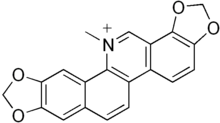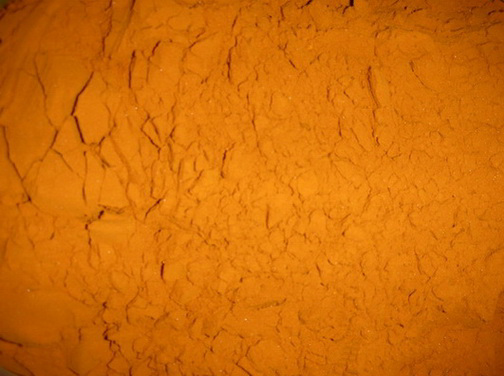商品中心
联系我们
长沙捷凯生物制品有限公司
联系电话:
+86-0731-82287663
+86-0731-82284663
传真号码:
+86-0731-82284663
邮 编:410016
地址:湖南省长沙市万家丽中路一段166号东郡华城广场A座2505室
商品名称:
Macleaya cordata Extract

规格:
35%, 60%, 80% Total alkaloids: Sanguinarine chloride &. Chelerythrine chloride mixt. HPLC
拉丁名:
Macleaya cordata (Wild) R.Br. (syn. Bocconia cordata Willd.)
使用部位:
Fruits
检测方法:
HPLC
CAS编号:
112025-60-2 (Total alkaloids), 2447-54-3 (Sanguinarine)
主要功能:
Anti-microbial, Anti-cancer
所属分类:
热销产品
关键词:
植物提取物
商品详情
Brief Introduction
Synonyms--- Macleaya cordata, Bocconia corrdata, Bocconia, Plume poppy, Tree celandine, Macleaya cordata (Willd) R.Br., Bocconia cordata Wild., Bocconia japonica André
Macleaya cordata Extract total alkaloids: Sanguinarine chloride-Chelerythrine chloride mixt.
Chemical Name: 13-Methyl-[1,3]benzodioxolo[5,6-c]-1,3-dioxolo[4,5-i]phenanthridinium chloride mixt. with 1,2-dimethoxy-12-methyl[1,3]benzodioxolo[5,6-c]phenanthridinium chloride
CAS No.: 112025-60-2 (219-503-3 for Sanguinarine chloride, 3895-92-9 for Chelerythrine chloride)
Molecular Formula: C20H14NO4.Cl; C21H18NO4.Cl
Mol. Wt.: 367.8 (for Sanguinarine chloride) &. 383.82 (for Chererythrine chloride)
Molecular Structure:

Sanguinarine (Pseudochelerythrine)
Chemical Name: 13-Methyl-[1, 3]benzodioxolo[5,6-c]-1,3-dioxolo[4,5-i]phenanthridinium
CAS No.:
Mol. Wt.: 332.09

Macleaya cordata(syn. Bocconia cordata Willd.), common name plume poppy and bocconia, belongs to the family Papaveraceae, is a herb native to herb of China and Japan. It is a perennial plant, with deep lobed leaves and dusty clouds of tiny bossoms at the tips of erect stems, most often a white color. It is widely cultivated as an ornamental plant for its plumelike panicles of creamy white flowers. Macleaya cordata is a poisonous plant,
Macleaya cordata is a bloodroot which owns thousand year history of medicinal usage in
Macleaya cordata Extract has the function of detumescence, detoxification and pesticide. It can be used in the treatment of furuncle, abscess, malignant boil, ulcer, scald and intractable tinea, etc. The product is virose and can not be taken orally.
Sanguinarine and chelerythrine containing in the product can restrain the growth of Gram positive bacteria in vitro. They are more sensitive to diplococcus pneumonlae, staphylococcus aureus and bacillus subtilis, and have stronger bacteriostastic activity than berberine. Macleaya Cordata has the function of antieelworm and antileptospira. Animal body experiment taken with rabbit contracting diplococcus pneumonlae proves that the injection of this product can inhibit and postpone the effect of fervescence caused by diplococcus pneumonlae, and have the function of antibiosis and refrigeration. The injection can also be used to treat lobar pneumonia, acute quinsy tonsillitis, tympanitis and tumor of thyroid. etc. The suppositories of sanguinarine and chelerythrine are used on the treatment of cervical erosion in clinically.
New anticancer drugs have been exploited with germs of Macleaya Cordata as the raw material by extraction and separation of alkaloid. Such as for treating Prostate cancer, Sanguinarine causes cell cycle blockade and apoptosis of human prostate carcinoma cells via modulation of cyclin kinase inhibitor-cyclin-cyclin-dependent kinase machinery. Several studies have shown that plant-derived alkaloids possess remarkable anticancer effects. Sanguinarine, an alkaloid derived from the bloodroot plant Sanguinaria canadensis, has been shown to possess antimicrobial, anti-inflammatory, and antioxidant properties. Previously, we have shown that sanguinarine possesses strong antiproliferative and proapoptotic properties against human epidermoid carcinoma A431 cells and immortalized human HaCaT keratinocytes. These results suggest that sanguinarine may be developed as an agent for the management of prostate cancer.
Sanguinarine is a quaternary ammonium salt from the group of benzylisoquinoline alkaloids. It is extracted from some plants, including bloodroot (Sanguinaria canadensis), Mexican prickly poppy Argemone mexicana, Chelidonium majus and Macleaya cordata. It is also found in the root, stem and leaves of the opium poppy but not in the capsule. In plants, sanguinarine is synthesized from dihydrosanguinarine through the action of Dihydrobenzophenanthridine oxidase.
Sanguinarine is a toxin that kills animal cells through its action on the Na+-K+-ATPase transmembrane protein. Epidemic dropsy is a disease that results from ingesting sanguinarine. If applied to the skin, sanguinarine kills cells and may destroy tissue. In turn, the bleeding wound may produce a massive scab, called an Eschar. For this reason, sanguinarine is termed an escharotic.
The Macleaya cordata Extract used in dietary supplements is derived from the fruits of the plant Macleaya cordata.
• Escharotic Effects
• Anti-cancer
• Anti-oxidant
• Anti-microbial and Anti-inflammatory
• Fungicidal and insecticidal
•Feed antibiotics Use
•Veterinary injection use
Referring to the above information.
Attentions: Poisonous and stimulating. It should be prevented from inhaling, swallowing, contacting skin, and entering eyes. Always seek advice from a professional before using a plant medicinally.
• Consult physicians for different condition specifics.
GNI’s Macleaya cordata Extract Features and Benefits:

• Produced with pure water only
• High purity: over 80%
• NO solvent - residual free
• Pesticide-free
• Red Yellow in appearance
• High anti-bacteria, and longer shelf life
Product Specifications:
35%, 60%, 80% Sanguinarine (Pseudochelerythrine) HPLC
35%, 60%, 80% Total alkaloids: Sanguinarine chloride &. Chelerythrine chloride mixt. HPLC
推荐商品

